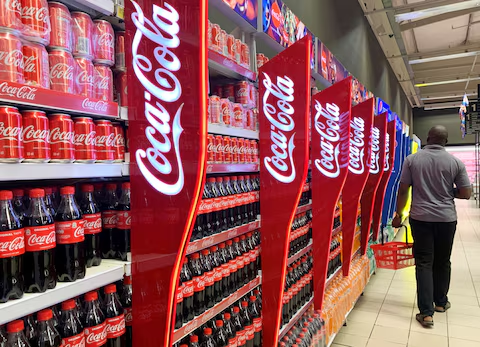Coca-Cola plans to invest $1 billion in its Nigeria operations over the next five years, the country’s presidency said after a meeting between President Bola Tinubu and senior executives of the soft drinks maker on Thursday.
Tinubu met John Murphy, president and chief financial officer of Coca‑Cola (KO.N), opens new tab, Zoran Bogdanovic, CEO of Coca-Cola HBC (CCH.L), opens new tab – one of Coca-Cola’s many bottlers worldwide – and several other company officials as he seeks to attract investment into the economy.
Bogdanovic told Tinubu that Coca-Cola had since 2013 invested $1.5 billion in Nigeria to expand its production capacity, improve its supply chain and on training and development, the Nigerian presidency said in a statement.
“I am very pleased to announce that, with a predictable and enabling environment in place, we plan to invest an additional $1 billion over the next five years,” Bogdanovic was quoted as saying.
A man walks past shelves of Coca-Cola bottles and cans at a Shoprite store inside Palms shopping mall in Lagos
A man walks past shelves of Coca-Cola bottles and cans at a Shoprite store inside Palms shopping mall in Lagos, Nigeria November 5, 2019. Temilade Adelaja/File Photo Purchase Licensing Rights, opens new tab
The investment announcement comes after Tinubu’s government saw several multinationals like Procter & Gamble, GSK Plc and Bayer AG leave the country or appoint third parties to distribute their products due to foreign exchange shortages.
Tinubu, in office since May last year, said his government wanted to create an environment open to businesses.
“We are building a financial system where you can invest, re-invest, and repatriate all your dividends. I have a firm belief in that,” he said.
Nigeria, with a population of more than 200 million is seen as a potential market for many global brands, but forex woes, red tape and policy inconsistency discourages some investors.
Bottler Coca-Cola HBC in April said its operating profit would rise this year, supported by strong demand for its coffee, energy and sparkling drinks even as prices were hiked to keep up with high costs and currency devaluation in countries like Egypt and Nigeria.
